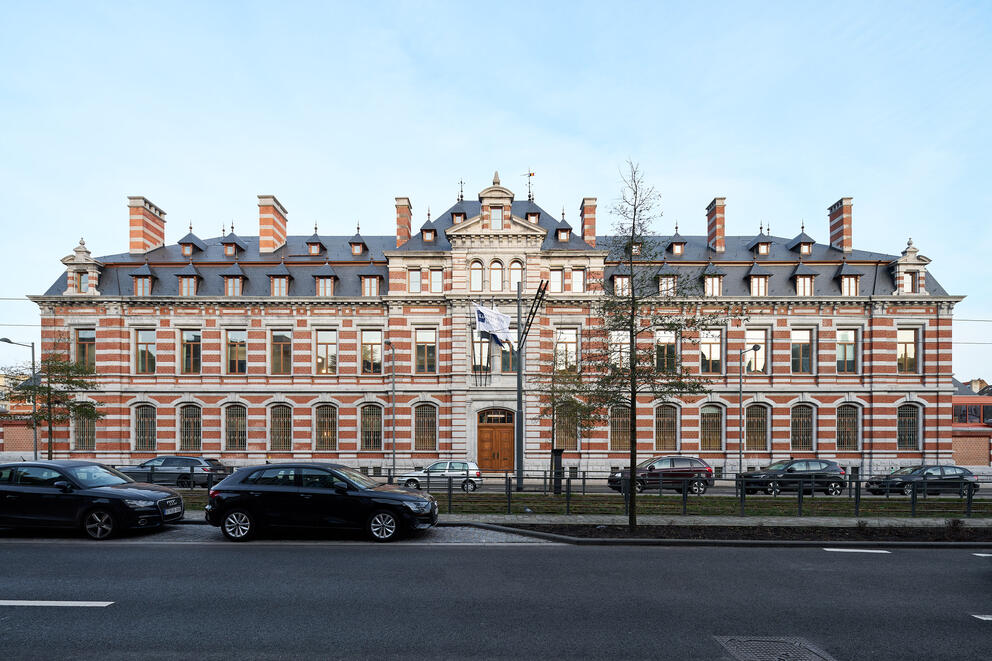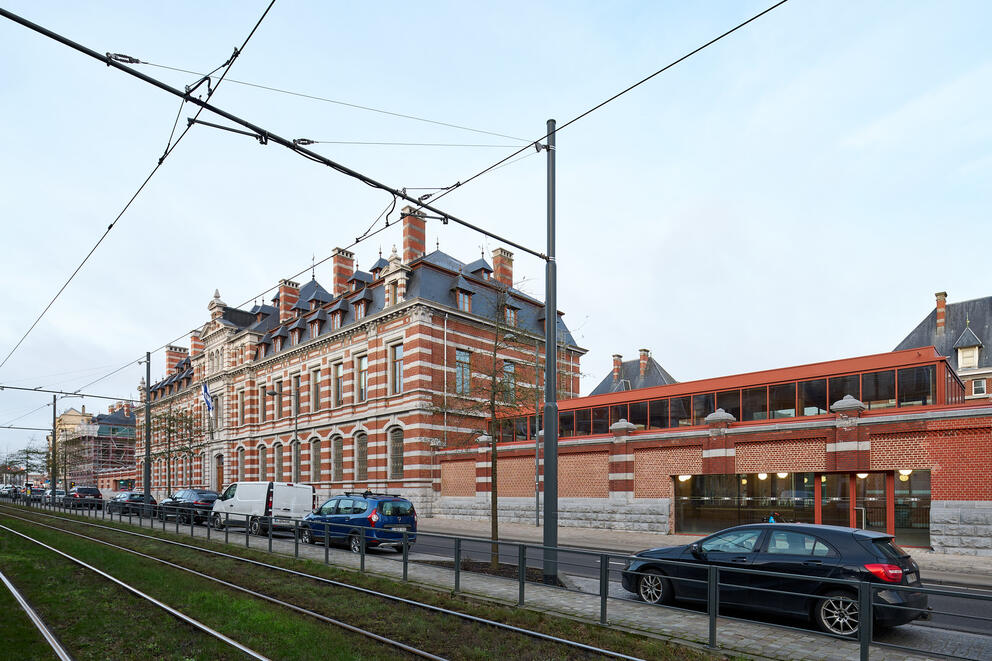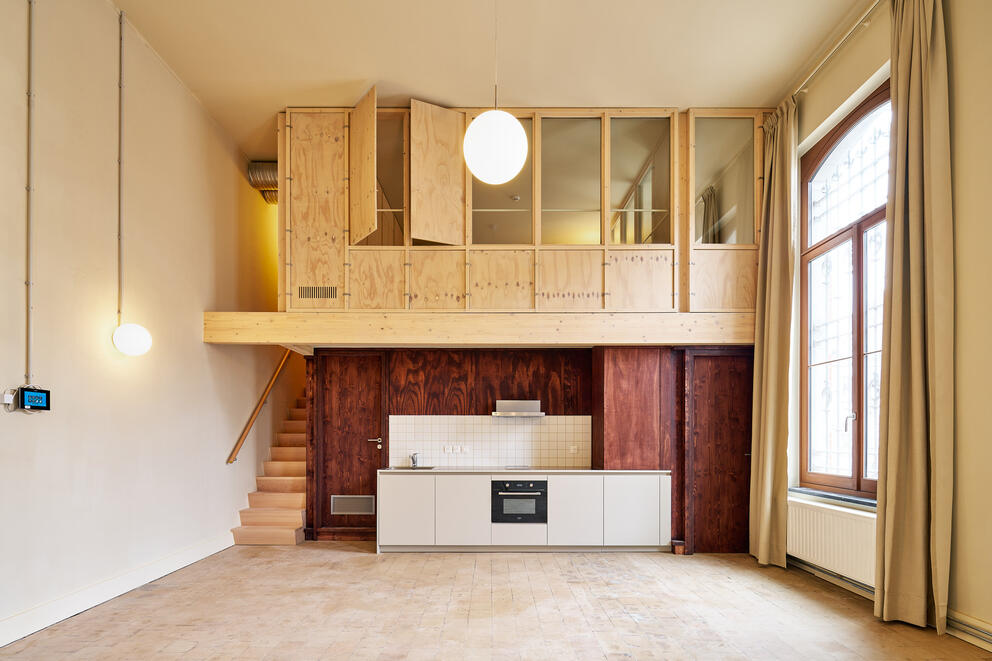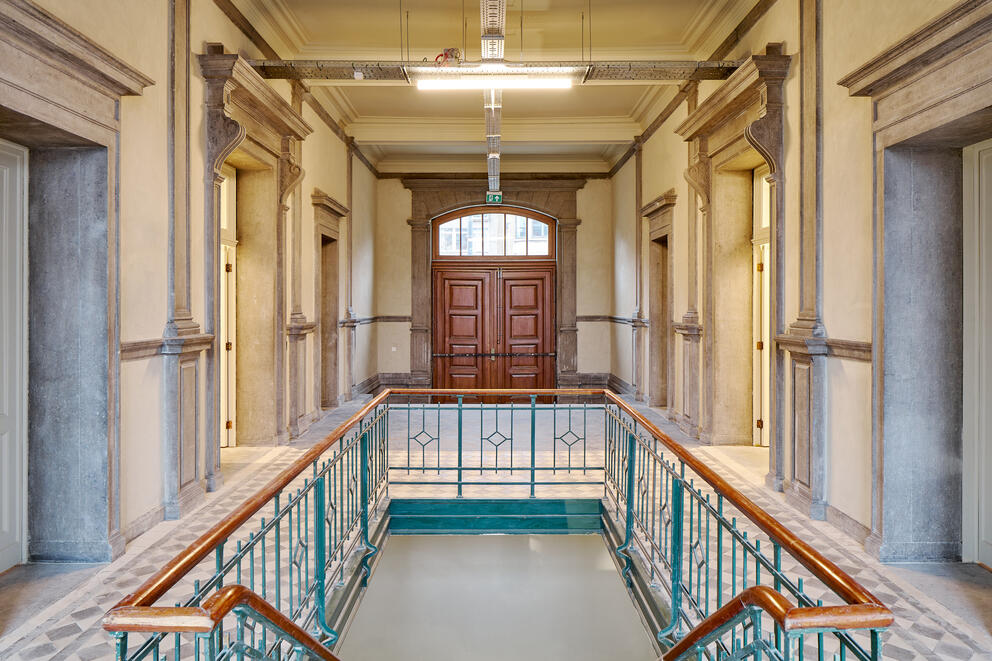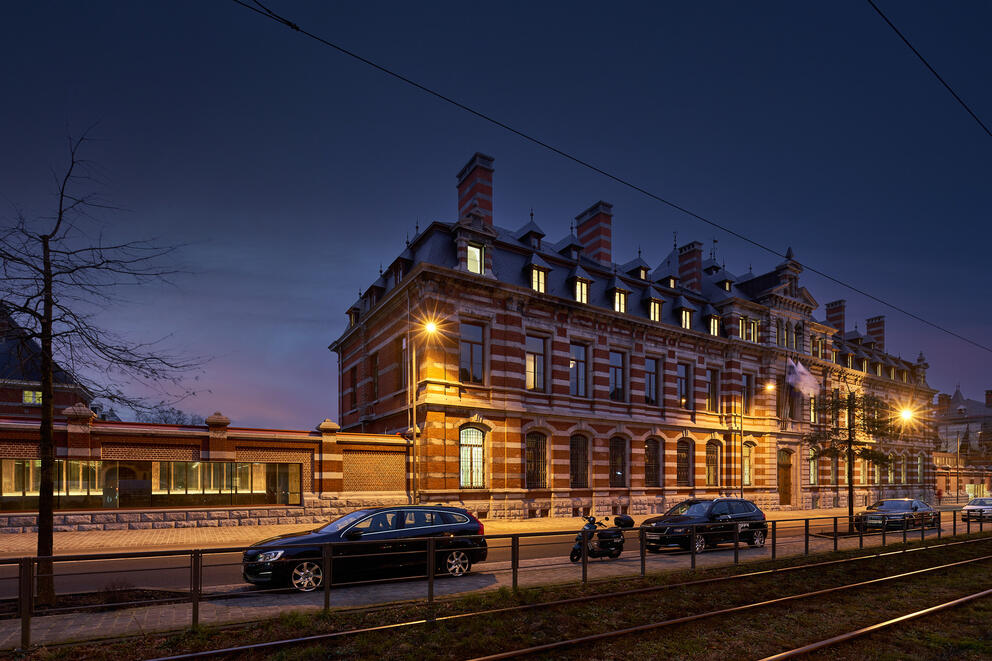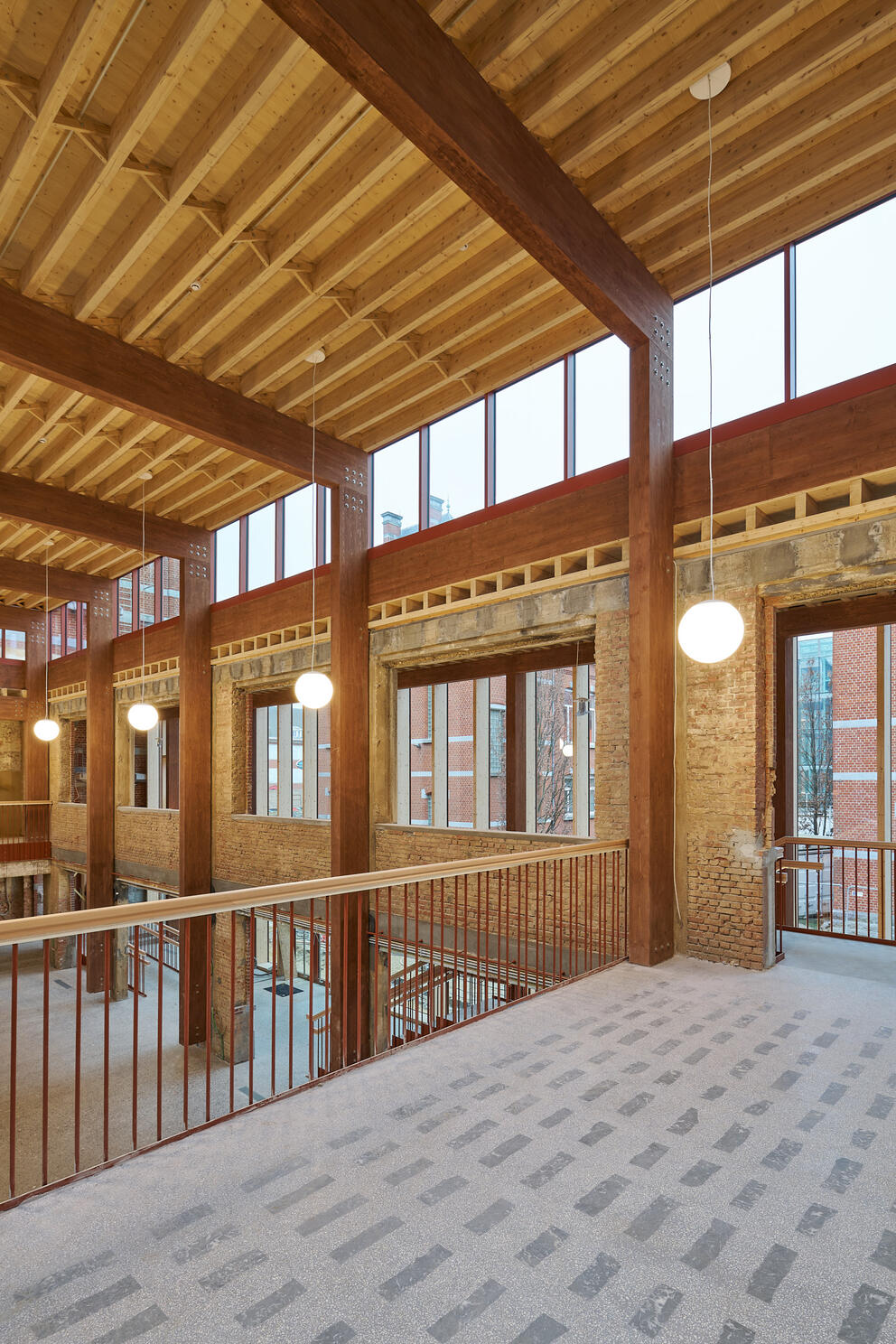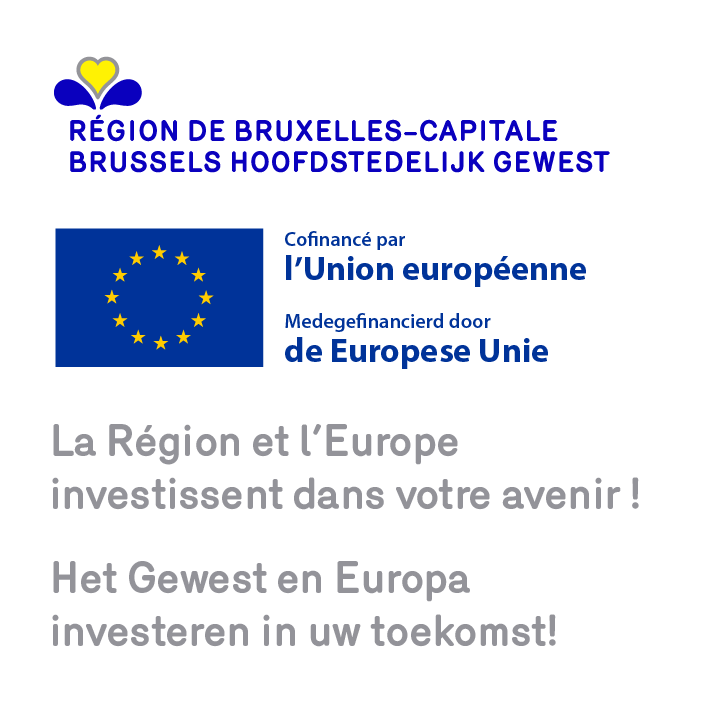International research centre inaugurated in the heart of Usquare.brussels: VUB and ULB expand with a beautifully renovated former barracks
On Thursday, 15 February, Vrije Universiteit Brussel (VUB) and Université libre de Bruxelles (ULB) presented their new international research centre during an official inauguration. Designed with the circular economy in mind, this joint project between Université libre de Bruxelles (ULB) and Vrije Universiteit Brussel (VUB) is supported by the European Union and the regional authorities.
The centre is located in the imposing main building of the Usquare.brussels project and focuses on research into sustainable development, education, dissemination of knowledge, entrepreneurship, and innovation. Both universities see this initiative as a means of reinforcing their urban commitment and of building a bridge between the academic world and the city and its residents. To do so, they can bank on the support from the European Union and the Brussels Government.
After almost two years, the works on the impressive main building of the former Fritz Toussaint barracks have finally been completed. Six buildings along Generaal Jacqueslaan have been transformed into an academic centre jointly managed by VUB and ULB.
Annemie Schaus, Rector of ULB, is delighted: "Usquare.brussels pursues it activities in the city by, in a spirit of co-creation, setting up technological and intellectual innovation centres in its very heart. The project embodies the internationalisation of Brussels and acts as a hub for the global commitment of both universities and their community. It is an extraordinary opportunity for Brussels and for our historic universities to cooperate in a community project that has been running since 2013. Sustainable development, education, dissemination of knowledge, entrepreneurship, and innovation are the mainstay of our new academic centre. Here, we build the city of tomorrow, which the university has a key role to play in.”
Jan Danckaert, Rector of VUB, underlines that commitment: “The Usquare.brussels project combines three essential forces. The first one being C for connectedness. Between the two universities, but also with Europe, via our respective partner alliances EUTOPIA and CIVIS, and with the Brussels population via an OpenLab for co-creation. The second one is F for free research. The Brussels Institute for Advanced Studies is committed to unrestrainedly seeking solutions for a sustainable world. The third one is P for progress. As a safe haven for co-creation, as a place where international and Belgian students can meet, as a place where thinking, research, and innovation take centre stage. In doing so, our project symbolises progress and, hence, the future, where the university is a major player.”
During his speech, Danckaert also paid tribute to the late Paul De Knop, former honorary rector of VUB, who was one of the main driving forces behind the project.
The Usquare.brussels site is 3.85 hectares in size, numbers 22 buildings, offering a total floor space of 56,500 m². The project boasts a research and teaching centre and will also serve as a living lab, open to other campuses and the city in general. The buildings managed by VUB and ULB will house the following actors:
- The Brussels Institute for Advanced Studies (BrIAS), an institute bringing top researchers from all over the world together to ponder society’s current sustainable development challenges. The new insights gained are shared via workshops for professionals, lectures for academics, and forums for the wider public. In return, BrIAS offers its fellows accommodation and a space to work;
- The Urban and Socio-Environmental Transformations Research Hub (USET), which focuses on research into cities, social and environmental issues, sustainable financing, economic resilience and into how tourist activities interact with various areas;
- The OpenLab, which acts as a functional space for participatory and community-based research. Members of the city and universities get together here to explore, comprehend, and address metropolitan issues. The lab focuses on human sciences and social innovation, along the lines of the FabLab which has been actively present at the Usquare.brussels site for some time;
- The European university alliances EUTOPIA and CIVIS, who connect VUB and ULB with 19 leading and like-minded European universities. The alliances aim to build a European university of the future: a university that brings communities from across Europe together via international exchanges to devise solutions to the key problems facing our society. With that, the head offices of EUTOPIA and CIVIS are now situated at a stone’s throw of the European institutions;
- The Brussels Studies Institute (BSI), a contact and coordination platform for academic research on Brussels;
- The editorial office of the Brussels Studies magazine;
- Multifunctional spaces, among which meeting and seminar rooms, offices for staff, flexible workspaces for guest researchers, a bar, and a reception area.
Renovations with support from the ERDF and the Brussels Government
The Maatschappij voor Stedelijke Inrichting [Urban Development Corporation] (SAU-MSI), in close collaboration with VUB and ULB, led the reconversion of the former barracks on behalf of the Brussels Regional Government.
Rudi Vervoort, Minister-President of the Brussels Region: "As a priority development pool of the Brussels Region, U-square is a splendid example of our vision for the development of new neighbourhoods with a pleasant, sustainable, and attractive living environment. Its unique dimension stems from the fact that it realises something many of us have always believed to be of paramount importance: opening up the university by situating it where the heart of the city beats. The ERDF programmes have contributed greatly towards achieving that objective.”
In 2016, Beliris, a joint venture between the Belgian Federal State and the Brussels Region, financed the purchase of the barracks. In addition, it saw to soil remediation and asbestos removal, in collaboration with SAU-MSI, VUB and ULB. Soil remediation, including the removal of overground and underground heating oil tanks, and the rehabilitation of polluted soil commenced in January 2020 and took 5 months to complete.
From April 2022 to October 2023, Federal Fund Beliris removed the asbestos from sixteen structures. An airtight zone was set up at several locations to prevent asbestos fibres dispersing into the air. The idea was to completely close off the intervention zone to ensure that no asbestos fibres would be released. All in all, Beliris invested 33 million euro in the Usquare.brussels project.
Karine Lalieux, Federal Minister with competence for Beliris: "The VUB and ULB interdisciplinary centre is a fine example of a textbook neighbourhood that combines academic and residential functions. Because of the example it sets and the role it plays in welcoming foreign students and researchers, the new complex will boost the Region’s image. Students form an intrinsic part of the urban fabric. They contribute to the vitality, identity, creativity, and economic and social development of Brussels. The new quarter will play an important catalytic role in making Brussels an even more attractive and pleasant university and student city. I couldn’t be more delighted that Beliris is once again making an important contribution to research, training programmes, and academic activity in Brussels.”
Renovation of the first seven buildings by the universities and SAU-MSI was in part made possible by a sizeable EU subsidy, supplemented with contributions from the two universities and the Brussels-Capital Region.
Gilles Delforge, Director of MSI: "The inauguration of the VUB and ULB academic centre is an important step towards the realisation of the Usquare.brussels project. It is the first project to have been delivered. It will be followed by further renovations to accommodate a centre for innovation and entrepreneurship, family homes (social rental housing and affordable purchase schemes), student accommodation, including the construction of a regional centre for autism spectrum disorders."
Aside from coordinating the entire Usquare.brussels project, SAU-MSI also bears overall responsibility for the following projects:
- renovation of the former equestrian centre, which it intends to turn into a food hall. In time, this food hall will undoubtedly become one of the flagships of Usquare.brussels and an invaluable shared facility for the residents living in the area;
- refurbishment of the public space;
- creation of a heating network;
- student accommodation;
- construction of the future Autism House.
With respect to the latter 2, SAU-MSI will shortly launch two design competitions to select the teams of architects that will be in charge of these reconversion projects.
Aside from developing a mixed and ambitious programme at this site, SAU-MSI also wants to make sure that the project is a sustainable one and chimes in with the circular economy. To this end, SAU-MSI has defined a site-specific circular strategy. Its general objectives are to manage the project’s existing material resources in an exemplary manner: working with what is there already, maximising reuse and the recycling of materials generated by deconstruction, selecting qualitative low-carbon materials…. As the universities support this approach, these principles have been fully incorporated into the newly inaugurated inter-university building.”
During renovations, the principles of sustainability and circular economy were central. Buildings were restored to their original state, with due regard for their new purpose. This required meticulous management of the materials, which meant that buildings were only demolished if they were deemed unstable and that new constructions were designed in a flexible manner to cater for evolving needs. Dismantled materials were recovered in situ inasmuch as possible and, where necessary, alternative locations and recycling methods were examined. The same approach was also used when it came to the lighting contract which took the form of a “Lighting as a Service” arrangement, and to the purchase of re-use or upcycled furniture.
In doing so, the Usquare.brussels project helps to enhance the environmental quality of urban spaces, with a focus on energy efficiency, reduction of emissions, and the upgrade of public infrastructure.
The European Regional Development Fund (ERDF) also awarded the project a grant of 9,033,200 euro.
Theodora Flikas, Directorate-General for Regional and Urban Policy of the European Union: "Core of the support policy is an approach that is based on partnership with local actors and citizens. Aside from the financial aspect, it produces concrete, tangible, results. Europa is close to its citizens".
Development of the Usquare.brussels site is still in full swing. By the end of 2030, the former gendarmerie site will be transformed into an open, diverse, and vibrant university quarter, connected to the city.
The event forms part of the programme of the Belgian presidency of the European Union.

